William Castle - Hollywood's Last True Showman - Classic Movie Madness
Main menu
- Home Page
- Featured Movie
- Double Feature
- Screen Legend
-
Reviews
- All Reviews
- Movie of the Month
- Double Feature
-
Cast and Crew
- Index
- Actors
- Directors
- Crew Members and Everyone else
- Producers and Other Evildoers
- Insane Rantings
- Now Showing
- Shop
William Castle - Hollywood's Last True Showman
"Step Right Up, I'm Gonna Scare The Pants Off America", as his 1975 autobiography is entitled, may well serve as the most fitting epitaph to the man who was loathed by critics only in equal measure to being adored by his fans. William Castle is today perhaps better remembered for the gimmickry he employed in promoting his
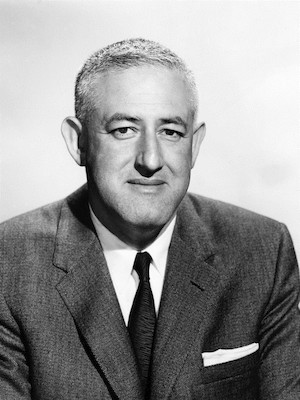
films than the actual movies themselves. Alhough, one could easily argue that therein lies the true measure of Hollywood's last great showman.
William Castle was born on April the 24th 1914 in New York City, New York, or at least William Schloss was. By all accounts William was a fairly shy and unassuming boy, that is until he realized that he had a talent for entertaining. Being able to lock his legs around his neck, as he was double jointed, he perform as the "Spider Boy", much to the delight and bemusement of his piers.
At the mere age of eleven William was orphaned and following that soon dropped out of school. He spent several years drifting around the New York theatre scene working in any capacity he could manage. This included stage hand, set builder, stage manager, actor and finally as a director. When he was only 16 he
convinced the producers of "An American Tragedy" that he was the nephew of Hollywood mogul Samuel Goldwyn. He later went on to work on the stage production of "Dracula" with Bella Lugosi, after successfully conning his way backstage one night.
Castle decided to 'Americanize' his name and changed it from Schloss(German for Castle) to Castle. Upon learning that Orson Welles was vacating his Stony Creek Theatre as he was set to leave for Hollywood in order to make motion pictures(the result of which was "Citizen Kane"(1941)). Castle approached Welles who then agreed to lease him the theatre at a rate of $500 a week.
Castle managed to secure the German actress Ellen Schwanneke, "Machden in Uniform"(1931), to star in his play. Objections were lodges by Actors' Equity over the fact that a foreign national was cast in the lead role instead of an American actress. Castle then claimed that he had discovered and was producing a lost German play entitled "Das Is Nicht Der Kinder"(which translates as : This is not for Children) and as such he required a German born actress for the role. This was however utter fiction, or stated more plainly – an outright lie. William Castle himself wrote the play over a two day period. Fiction or the not, the story was successful in it's design as Actors' Equity withdrew their objections.
When Ellen Schwanneke was asked by the Third Reich to return to Germany she declined. In this Castle saw a golden, if not somewhat unscrupulous, marketing opportunity. Billing Schwanneke as the 'woman who refused Hitler'. Even going so far as to vandalize his own theatre with swastikas, then claiming that Nazi sympathizers were trying to stop him from putting on the play. The deception worked, he received substantial media coverage and the play was a success.
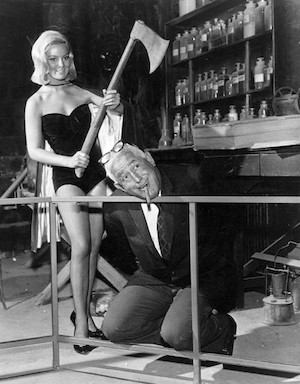
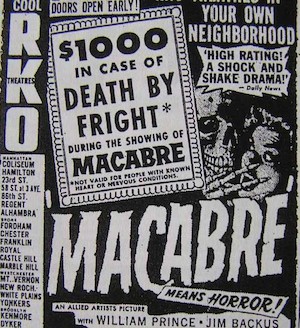
Columbia Pictures soon came calling and after meeting with the infamous 'King' Cohn, president of Columbia -
Castle's directorial debut came in 1943 with the crime drama "The Chance of a Lifetime". The Hollywood Reporter received the movie by saying that "William Castle... is unfit to handle a motion picture". Castle however continued to direct a slew of, totaling no less than forty(40), films between 1943 and 1956 for Columbia and Universal Studios. He garnered a reputation for being able to deliver a bankable movie under budget and within schedule.
During 1947 William Castle and Orson Welles once again crossed
paths when Castle worked as the second unit director on Welles' film noir classic "The Lady From Shanghai". Castle happened to pick up amoebic dysentery and lost a considerable amount of weight as a result of the illness during this experience.
After Castle's contract with Columbia expired in 1956 he worked briefly in television. His credits can be spotted on shows such as "The Californians", "Men of Annapolis" and "Science Fiction Theatre".
After seeing the french thriller "Les Diabolique"(1955), re-
"Macabre" was an all or nothing gamble for Castle, having mortgaged his house to produce the film for $86 000. Not taking any chances, and perhaps realizing that the film was not as strong as he'd hoped, he reverted back to his marketing trickery.
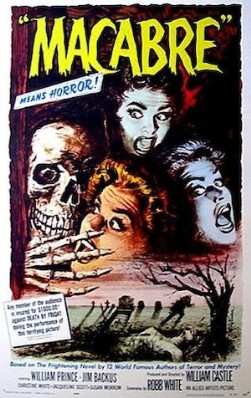
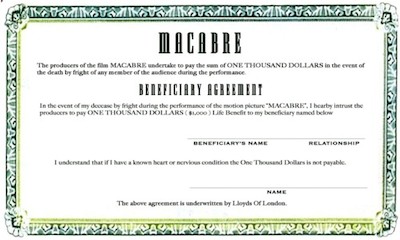
He then swiftly moved on to produce and direct what are widely considered to be two of his finest films : "House on Haunted Hill"(1959) and "The Tingler"(1959).
Vincent Price and Carol Ohmart were the acrimonious couple in "House on Haunted Hill" trying to survive a night in a haunted house with five strangers. For this Castle invented "Emergo". Which amounted to little more than a plastic skeleton, attached to a pulley system, swooping over the audience at key scenes. This was initially met with fright, then amusement and finally as target practice for many an unruly teenager.
Taking out an insurance policy with Loyds of London that would pay out the princely sum of $1000 to the estate of any audience member who should happen to die of fright during the screening of the movie, no one ever collected. Upon occasion he even arranged for ambulances to be parked outside the theatres so the deceased could be hurried away. Publicity of this brought audiences to see what the fuss was all about and the film was a massive hit at the box office. Castle managed to sell "Macabre" to Allied Artists for twice his production budget as well as a percentage of the profits.
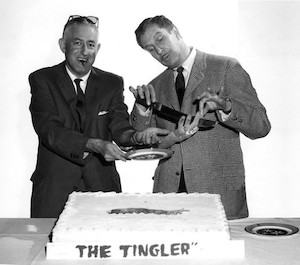
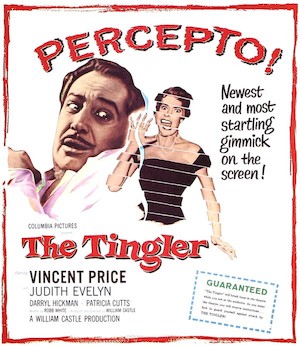
"The Tingler" again billed Vincent Price this time as a pathologist who discovers a creature that is born of human fear and kept at bay only by screaming. "Percepto" was Castle's trophy card this time around. Erroneously, and rather widely, reported as electrodes affixed to theatre chairs to give patrons a jolt of electricity at key scenes. What "percepto" in fact was, were military surplus aircraft wing de-
For "13 Ghosts"(1960) the trick was "Illusion-
Castle reached the peak of his gimmickry in 1961 with "Homicidal", introducing a 45 second 'fright break' at the climax of the film involving an elaborate carnival style production enticing moviegoers to seek refuge in 'cowards corner' and finally receive a refund for being too frightened to view the entire movie. John Waters sayd it best in his 1983 book "Crackpot: The Obsessions of John Waters"in a chapter entitled "Whatever Happened to Showmanship?" where he writes :
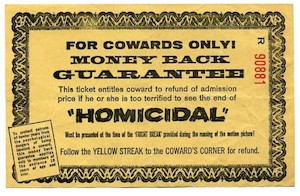
"William Castle simply went nuts. He came up with 'Coward's Corner,' a yellow cardboard booth, manned by a bewildered theater employee in the lobby. When the Fright Break was announced, and you found that you couldn't take it anymore, you had to leave your seat and, in front of the entire audience, follow yellow footsteps up the aisle, bathed in a yellow light. Before you reached Coward's Corner, you crossed yellow lines with the stenciled message: 'Cowards Keep Walking.' You passed a nurse (in a yellow uniform?...I wonder), who would offer a blood-
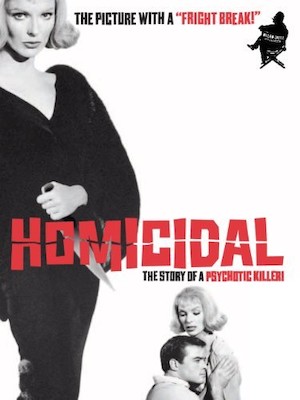
Things got scaled back from here, for "Mr. Sardonicus"(1961) the film was again paused at the climax where this time William Castle himself appeared on screen to take a supposed 'punishment poll' wherein the audience would "vote" whether to have mercy of further punish the movie's villain. The audience were provided with large cardboard thumbs that would point either up to show mercy or down to inflict further punishment. The film would then conclude based on the audience' "vote". However, there is no known instance where the mercy ending was ever seen nor is it known to even exist. This suggests that it was merely a clever ruse on Castle's behalf to give the audience the illusion of control over the film's conclusion.
At the behest of the production studios and his partners Castle dropped the over-
cardboard axe at a screening of "Strait-
William Castle's most famous film though was one he did not direct himself, acting instead purely as producer. He managed to purchase the film rights to the Ira Levin novel "Rosemary's Baby" while it was still in galley format. Although he was eager to direct the movie Paramount insisted that it would be best if another director was found , Castle conceded and Roman Polansky was hired in stead. Castle did
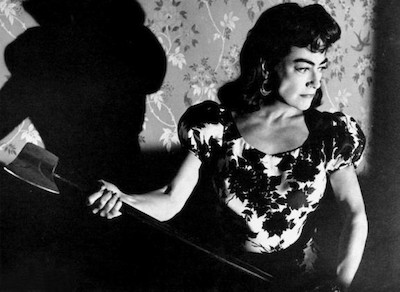
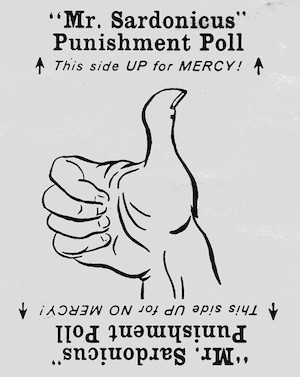
however manage to obtain a small cameo for himself in the movie. "Rosemary's Baby" is widely regarded as one of the finest horror films ever made, and is a part of the IMDB top250 list.
Castle only produced and directed a handful of project after that including "Shanks"(1974), "Riot"(1969) and his TV show "Circle of Fear". William Castle died at the age of 63 on May 31 1977 from a heart attack.
Castle may have fancied himself a modern day P.T. Barnum with his marketing shenanigans but he chose to style himself after Alfred Hitchcock, whom he greatly admired. From appearing in his movies' trailers to the near shameless self promotion and even a signature cigar smoking silhouette, the parallels are self evident.
At one time when he was referred to as a poor man's Hithcock a member of the entertainment press rebuked by remarking that saying so was both an insult to poor men and Hitchcock. Even though Castle never achieved the level of recognition for his work that Hitchcock did, his contribution to the horror genre especially can not be under-
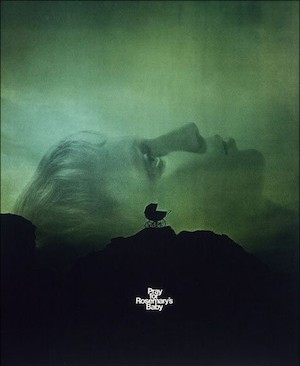
Written by the Classic Movie Master
Posted on 08 March 2013
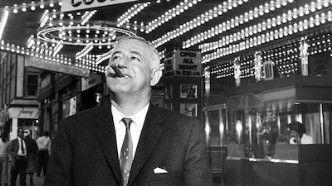
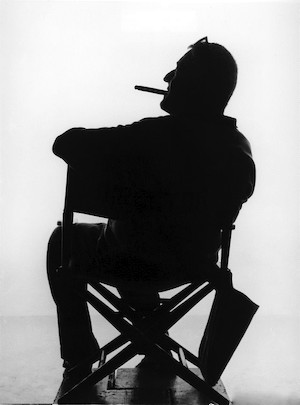
Year |
Title |
Character |
Medium |
1937 |
When Love Is Young |
Reporter (uncredited) |
Film (Universal Pictures) |
1937 |
It Could Happen to You! |
Dignified Reporter (uncredited) |
Film (Republic Pictures) |
1937 |
The Man Who Cried Wolf |
Customer at Box Office (uncredited) |
Film (Universal Pictures) |
1940 |
Music in My Heart |
N/A - |
Film (Columbia Pictures) |
1940 |
The Lady in Question |
Angry Juror #1 (uncredited) |
Film (Columbia Pictures) |
1940 |
He Stayed for Breakfast |
Policeman (uncredited) |
Film (Columbia Pictures) |
1941 |
Penny Serenade |
N/A - |
Film (Columbia Pictures) |
1942 |
Stand By All Networks |
N/A - |
Film (Columbia Pictures) |
1942 |
North to the Klondike |
N/A - |
Film (Universal Pictures) |
1943 |
Black Marketing |
N/A - |
Film (RKO) |
1943 |
The Chance of a Lifetime |
N/A - |
Film (Columbia Pictures) |
1943 |
Klondike Kate |
N/A - |
Film (Columbia Pictures) |
1944 |
The Whistler |
N/A - |
Film (Columbia Pictures) |
1944 |
She's a Soldier Too |
N/A - |
Film (Columbia Pictures) |
1944 |
When Strangers Marry |
N/A - |
Film (King Brothers Productions) |
1944 |
The Mark of the Whistler |
N/A - |
Film (Columbia Pictures) |
1945 |
Dillinger |
N/A - |
Film (King Brothers Productions) |
1945 |
The Crime Doctor's Warning |
N/A - |
Film (Columbia Pictures) |
1945 |
Voice of the Whistler |
N/A - |
Film (Columbia Pictures) |
1946 |
Just Before Dawn |
N/A - |
Film (Columbia Pictures) |
1946 |
Mysterious Intruder |
N/A - |
Film (Columbia Pictures) |
1946 |
The Return of Rusty |
N/A - |
Film (Columbia Pictures) |
1946 |
Crime Doctor's Man Hunt |
N/A - |
Film (Columbia Pictures) |
1947 |
Crime Doctor's Gamble |
N/A - |
Film (Columbia Pictures) |
1947 |
The Lady From Shanghai |
N/A - |
Film (Columbia Pictures) |
1948 |
Texas, Brooklyn & Heaven |
N/A - |
Film (Robert S. Golden Productions) |
1948 |
The Gentleman from Nowhere |
N/A - |
Film (Columbia Pictures) |
1949 |
Johnny Stool Pigeon |
N/A - |
Film ( Universal International Pictures) |
1949 |
Undertow |
N/A - |
Film ( Universal International Pictures) |
Year |
Title |
Character |
Medium |
1950 |
It's a Small World |
Cop (uncredited) / Writer / Director |
Film (Motion Pictures Inc.) |
1951 |
The Fat Man |
N/A - |
Film ( Universal International Pictures) |
1951 |
Hollywood Story |
N/A - |
Film ( Universal International Pictures) |
1951 |
Cave of Outlaws |
N/A - |
Film ( Universal International Pictures) |
1953 |
Fort Ti |
N/A - |
Film (Columbia Pictures) |
1953 |
Serpent of the Nile |
N/A - |
Film (Columbia Pictures) |
1953 |
Conquest of Cochise |
N/A - |
Film (Columbia Pictures) |
1953 |
Slaves of Babylon |
N/A - |
Film (Columbia Pictures) |
1954 |
Charge of the Lancers |
N/A - |
Film (Columbia Pictures) |
1954 |
Battle of Rogue River |
N/A - |
Film (Columbia Pictures) |
1954 |
Jesse James vs. the Daltons |
N/A - |
Film (Columbia Pictures) |
1954 |
Drums of Tahiti |
N/A - |
Film (Columbia Pictures) |
1954 |
The Iron Glove |
N/A - |
Film (Columbia Pictures) |
1954 |
The Saracen Blade |
N/A - |
Film (Columbia Pictures) |
1954 |
The Law vs. Billy the Kid |
N/A - |
Film (Columbia Pictures) |
1954 |
Masterson of Kansas |
N/A - |
Film (Columbia Pictures) |
1955 |
The Americano |
N/A - |
Film (RKO) |
1955 |
New Orleans Uncensored |
N/A - |
Film (Columbia Pictures) |
1955 |
The Gun That Won the West |
N/A - |
Film (Columbia Pictures) |
1955 |
Duel on the Mississippi |
N/A - |
Film (Columbia Pictures) |
1956 |
The Man Called X S.1 Ep.4 - |
N/A - |
TV (ZIV Television Programs) |
1956 |
The Houston Story |
N/A - |
Film (Columbia Pictures) |
1956 |
Uranium Boom |
N/A - |
Film (Columbia Pictures) |
1956 |
Science Fiction Theatre S.2 Ep. 3 - |
N/A - |
TV (ZIV Television Programs) |
1957 |
The Adventures of McGraw |
N/A - |
TV (NBC) |
1957 |
Men of Annapolis |
N/A - |
TV (ZIV Television Programs) |
1957 |
The Californians S. 1 Ep. 13 - |
N/A - |
TV (NBC) |
1958 |
Target S. 1 Ep. 1 - |
N/A - |
TV (ZIV Television Programs) |
1958 |
Man with a Camera s. 1 Ep. 4 - |
N/A - |
TV (ABC) |
1958 |
Macabre |
N/A - |
Film (Allied Artists Pictures) |
1959 |
A Christmas Festival |
The Cold Man (as Billy Castle) |
TV Movie |
1959 |
N/A - |
Film (Allied Artists Pictures) |
|
1959 |
The Tingler |
N/A - |
Film (Columbia Pictures) |
Year |
Title |
Character |
Medium |
1960 |
13 Ghosts |
N/A - |
Film (Columbia Pictures) |
1961 |
Homicidal |
N/A - |
Film (Columbia Pictures) |
1961 |
Mr. Sardonicus |
N/A - |
Film (Columbia Pictures) |
1962 |
Zotz! |
N/A - |
Film (Columbia Pictures) |
1963 |
13 Frightened Girls! |
N/A - |
Film (Columbia Pictures) |
1963 |
The Old Dark House |
N/A - |
Film (Columbia Pictures) |
1963 |
The Plot Thickens |
N/A - |
Film (Screen Gems) |
1964 |
Strait- |
N/A - |
Film (Columbia Pictures) |
1964 |
The Night Walker |
N/A - |
Film (Universal Pictures) |
1965 |
I Saw What You Did |
N/A - |
Film (Universal Pictures) |
1966 |
Let's Kill Uncle, Before Uncle Kills Us |
Russell Harrison (in car wreck) (uncredited) - |
Film (Universal Pictures) |
1967 |
The Busy Body |
N/A - |
Film (Paramount Pictures) |
1967 |
The Spirit Is Willing |
Mr. Hymer (unconfirmed) - |
Film (Paramount Pictures) |
1968 |
Project X |
N/A - |
Film (Paramount Pictures) |
1968 |
Rosemary's Baby |
Man by Pay Phone (uncredited) - |
Film (Paramount Pictures) |
1969 |
Riot |
N/A - |
Film (Paramount Pictures) |
Year |
Title |
Character |
Medium |
1972 |
Circle of Fear |
J.B. Filmore - |
TV (NBC) |
1974 |
The Sex Symbol |
Jack P. Harper |
Film (ABC) |
1974 |
Shanks |
Grocer - |
Film (Paramount Pictures) |
1975 |
Shampoo |
Sid Roth |
Film (Columbia Pictures) |
1975 |
Bug |
N/A - |
Film (Paramount Pictures) |